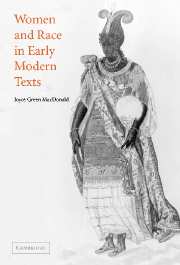Book contents
- Frontmatter
- Contents
- Acknowledgments
- Disclaimer
- Introduction: women, race, and Renaissance texts
- 1 Cleopatra: whiteness and knowledge
- 2 Sex, race, and empire in Shakespeare's Antony and Cleopatra
- 3 Dido and Sophonisba of Carthage: marriage, race, and the bonds between men
- 4 The disappearing African woman: Imoinda in Oroonoko after Behn
- 5 Race, women, and the sentimental in Thomas Southerne's Oroonoko
- 6 Chaste lines: writing and unwriting race in Katherine Philips' Pompey
- 7 The queen's minion: sexual difference, racial difference, and Aphra Behn's Abdelazer
- Conclusion: “The efficacy of Imagination”
- Bibliography
- Index
7 - The queen's minion: sexual difference, racial difference, and Aphra Behn's Abdelazer
Published online by Cambridge University Press: 22 September 2009
- Frontmatter
- Contents
- Acknowledgments
- Disclaimer
- Introduction: women, race, and Renaissance texts
- 1 Cleopatra: whiteness and knowledge
- 2 Sex, race, and empire in Shakespeare's Antony and Cleopatra
- 3 Dido and Sophonisba of Carthage: marriage, race, and the bonds between men
- 4 The disappearing African woman: Imoinda in Oroonoko after Behn
- 5 Race, women, and the sentimental in Thomas Southerne's Oroonoko
- 6 Chaste lines: writing and unwriting race in Katherine Philips' Pompey
- 7 The queen's minion: sexual difference, racial difference, and Aphra Behn's Abdelazer
- Conclusion: “The efficacy of Imagination”
- Bibliography
- Index
Summary
In this chapter, I will discuss the nature of the links between race and notions of gender, family and the state in Aphra Behn's Abdelazer (1676). Here, I believe, race is instrumental in shaping the play's political and sexual assumptions: miscegenation is symptomatic of the senescent patriarchal order that Abdelazer portrays, and also performs critical conceptual labor for the insurgency led by the angry young prince, Philip. While the play may seem to make its claims on behalf of absolutism and sovereignty in a rather perfunctory fashion, it is much more assertive in identifying beliefs about race as a key component of Philip's stand against the regime headed by his mother and her Moorish lover. But this regime, in its turn, is grounded in the queen's voracious and destructive sexual appetites. Abdelazer implicates race in the crisis of familial and political institutions it portrays, but at least in the first part of the play, its Moorish antihero is also presented as a victim of a female sexuality which knows no bounds. Black man and white queen both figure in the play's outcomes, but they figure differently.
Making any kind of critical comment on this play has apparently been difficult. Even in the midst of the current Aphra Behn boom, commentary on Abdelazer is rare. The play earns two pages of discussion in Derek Hughes' recent overview of late seventeenth-century English drama, but is absent from Susan Owen's Restoration Theatre and Crisis, despite the striking appropriateness of her general remarks on how family order becomes “an important way in which dramatists engage with the problem of order and disorder in the state” to the play.
- Type
- Chapter
- Information
- Women and Race in Early Modern Texts , pp. 144 - 163Publisher: Cambridge University PressPrint publication year: 2002



